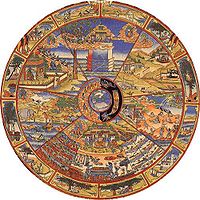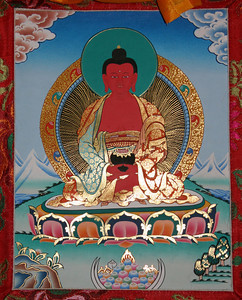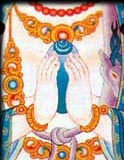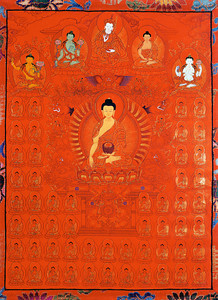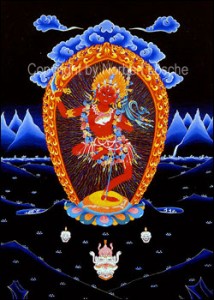
An excerpt from a teaching called Perception and Karma by Jetsunma Ahkon Lhamo, July 19, 1989
At the heart of all phenomena, at the heart of all feeling, at the heart of all thought, at the heart of all experience, at the heart of self-nature, at the heart of all things, is the nature of emptiness. Neither self-nature nor phenomena can be considered separate from emptiness. All phenomena are inseparable from emptiness. It is indistinguishable from emptiness. It is the same as emptiness. It arises from emptiness, and it returns to emptiness. At the heart of every single experience, everyone without exception, including the ones that we react to in the various ways that we react, there lies the mother of all phenomena, the heart of emptiness.
From that point of view, since all things arise from emptiness, are the same as emptiness and inseparable from emptiness. All phenomena are the same. For those of you who practice Dorje Phagmo, one of the most outstanding and obvious qualities of Dorje Phagmo is that she cuts attachment to phenomena being one way or another. She relates to phenomena in such a way that all phenomena are the same and she experiences the sameness of all phenomena. In truth all phenomena is the same taste. The analogy that can be used to really get the point home is that, from that point of view, shit is the same as chocolate. They are the same nature, the same essence, the same taste.
Yet, we do not experience them as the same. We want to eat chocolate and we feel repelled, terribly repelled, by shit. We would like to have the chocolate bar, but we would not eat a bowl of shit. That would be very difficult for us to do. One would be delicious and the other would be utterly repulsive. So, if these things have the same nature, what, then, is the difference? The difference, of course, is the perceptual process that we are engaged in.
This perceptual process is both collective and individual. That is to say, there are certain things that groups, such as all human beings, might perceive similarly, not the same, but similarly. There are some phenomena that perhaps would be experienced in a cultural way. One group would experience something in one way and another group might experience it in another way. There are some forms of phenomena that most sentient beings may experience in a certain way. Even within those samenesses and those likenesses, a person within a group actually experiences that phenomena in a very individual way. That individuality cannot be understood because there is not a true communication that can describe how experience happens.
How that occurs, of course, is through the means of karma. Each of us has a certain karmic format. We seem to be programmed in a karmic way. Each of us operates very differently due to our karma. The expression is, “due to the karma of our minds.” This is, of course, according to the ordinary mind, the mind that is experiencing delusion, not the mind of awakening. We have some similar karma, obviously. We’re all sitting in the same room. If we did not have similar karma, we would not be as close as we are. Not only are we sitting in the same room but we see each other quite frequently, we’ll probably see each other for the rest of our lives, with any luck, and we will continue to have a relationship in this way. So we have some similar branches of karma. We live in the same city, we live in the same state, we live in the same nation, and we live on the same Earth at the same time.
Yet, each of us has individual karma. It takes a tremendous amount of similarity, for instance, for all of you to have gotten ordained at the same time. If you could conceive of the tremendous ripening that had to have occurred at that time, you would understand, then, the tremendous bond that you share. It takes a tremendous amount of ripening for us to come together at this time, for all of us, in order to experience a life that is about Dharma. There has to be a tremendous amount of ripening of very pure and virtuous karma in order for that to happen. Yet, even with all of that, we have differences in our karma. The differences are so deep and yet so subtle that one person, who has similar karma with another person, cannot talk to that person and describe exactly what their experience is. No one can communicate exactly what their experience is. Even if you felt that you had thoroughly communicated your experience that would basically be a misunderstanding because the other person could not have understood what you said. They do not have the same karma as you. It is impossible. You could not exactly describe how you experience a small object for instance. If you did, she would hear it in the way that she experiences it. There is no meeting, there is some overlapping, but there isn’t an intimate sameness about our experience.
For this reason, all scientific tools, from this point of view, are utterly useless. A simple thing, such as a thermometer, is useless. If I put it in my mouth and had two people read it they would both say 98.6. But the meaning of their experience, the way in which it was received, what they say, every single piece of what happened in order for that to happen is quite different. The sameness of the karma is indicated by their ability to sit together and have the opportunity to read the thermometer at the same time. But the sameness is not in the experience. It is an illusion that we all live with that makes us think that we all have the same experience.
In a very ordinary way, this accounts for the unbelievable thing that happens when groups of people get together and try to pass along information. It also explains how it is that gossip should be outlawed. All things that are communicated in that way are different. So, in one way, it is best to do as the Buddha does and just shut up for awhile until you get enlightened.
Each of us, then, is totally and completely involved in a perceptual play that we believe to be real. We constantly experience self and other, we constantly experience phenomena surrounding us. We constantly experience thoughts and feelings within our own mind and are constantly involved in reaction. Do we understand how completely and totally individual that is? If we did understand that, we would have a way to understand how artificial the entire construction is and how it is absolutely dependent on one’s karma. How useless it is to try to react or not react in a certain way in order to change things. How useless it is to try and manipulate phenomena in order to get a certain result. We would understand, then, that the only lasting means by which to make change, is to purify one’s karma.
I think of an example of someone, one of my students who is constantly bothered by losing things or having others mishandle things. The only cure to a situation such as that is not what we usually try to do, which is to lay blame or take measures or lock stuff up. The only lasting cure for something like that would be the practice of generosity. The result of the karma of a generous mind is a feeling that is a state free of lack, a state that is without doubt or anger or without the building blocks that cause a situation to occur again and again and again. The karma of a generous mind is such that those kinds of things simply don’t happen. There is more stability in a generous mind. A person who has truly practiced and attained selfless generosity, the experience of such a person will be stable, it will not be challenging in the way that the life of an ego-clinging person is. It will not have the same frustrations. It will not have the constant vacillation between having and not having. The karma of loss will not be there. But we don’t understand this. We constantly revolve in a very tight opera in which we are the stars and all the scenery is created just for us. What we don’t realize is that it’s also created by us, and that no one else is playing.
Copyright © Jetsunma Ahkon Lhamo. All rights reserved
